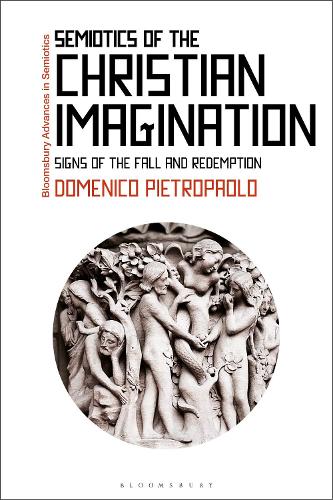
Semiotics of the Christian Imagination: Signs of the Fall and Redemption
(Hardback)
Available Formats
Publishing Details
Semiotics of the Christian Imagination: Signs of the Fall and Redemption
By (Author) Professor Domenico Pietropaolo
Bloomsbury Publishing PLC
Bloomsbury Academic
10th December 2020
United Kingdom
Classifications
Professional and Scholarly
Non Fiction
Semantics, discourse analysis, stylistics
233.14014
Physical Properties
Hardback
256
Width 156mm, Height 234mm
540g
Description
The semiotics of the Christian imagination describes the repository of signs and the logic of signification through which a community of faith envisions spiritual truths. This book analyses various examples in text, images, music, art and scientific treatise of the imaginative semiotisation of the fall of Man and the Church's semiotic perception of the Divine plan for Redemption. The book includes a chapter detailing the theory of signs, based on a close reading of primary sources, and has nine further chapters on the meaning-making inherent in ideas of the Fall and Redemption of mankind. These are filtered through and given material representation by the semiotic paradigms of various cultural fields, including philology, verbal arts and science. Central to this practice - and to the book's message - are two themes of theological semiotics fundamental to man's understanding of himself in the larger scheme of things. Two of these include the theology of the Fall and a sacramental theory of signs. The theory is grounded in the doctrine of analogy, and this is the only reliable cognitive link between the immanence of the thinking subject and the transcendence that is the object of thought.
Reviews
A riveting account of the Christian Weltanschauung and an erudite tour de force astride visual and textual argumentation. Pietropaolo regales the reader with a fundamental work for thoroughly understanding the Christian imagination, an important cultural pillar of the West. * Antonio Rossini, Professor of Languages, Literatures and Cultures, University of Windsor, Canada *
The creative interplay of the semiotics of Christian Imagination, Medieval and Renaissance studies is engaging both in creativity and diversity and provides a creative new approach to theological anthropology. An original work informed by rich and diverse primary sources. * Anne Anderson, President Emerita, University of St Michaels College, Toronto, Canada *
Author Bio
Domenico Pietropaolo is Professor of Italian Studies and Drama at the University of Toronto, Canada.
